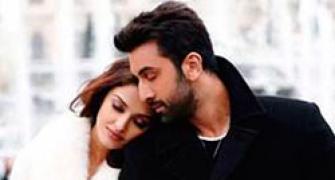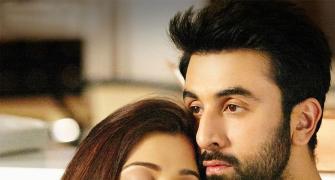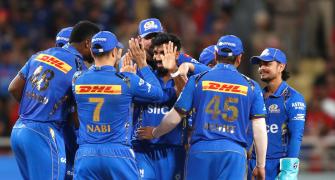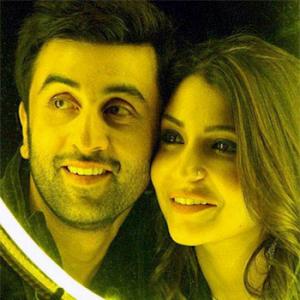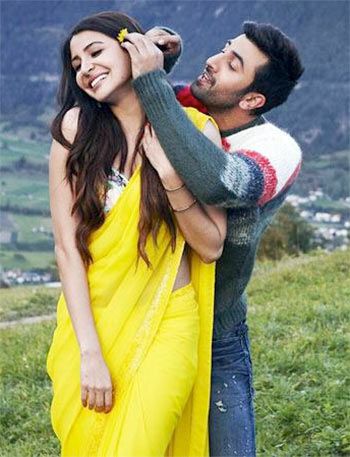 Ae Dil Hai Mushkil Is a film about tedha love -- crooked love, love that refuses to stay straight -- and about the unshared, pure potency of unrequited passion, says Raja Sen.
Ae Dil Hai Mushkil Is a film about tedha love -- crooked love, love that refuses to stay straight -- and about the unshared, pure potency of unrequited passion, says Raja Sen.
Ae Dil Hai Mushkil opens with Ranbir Kapoor's character, Ayan, talking to an interviewer.
She commends the singer on the fact that he's broken through and found a foothold in music, 'that too non-film,' and in a couple of lines, he calls his love 'aamir' -- which is to say the kind that cannot die.
It is an atypical choice of word, and a couple of seconds later when we meet young Ayan fumbling around and proving to be a feeble kisser, it is clear that the nuanced usage of the word, the Persian use over the Urdu use, isn't a part of his vocabulary. At least not yet.
Over the course of Ae Dil Hai Mushkil, this character learns to feel, to address, and to speak.
Karan Johar's new film casts Kapoor in that clueless persona the actor has often inhabited, but chooses to hand the reigns of the narrative -- and, indeed, of the young man's heart -- to Anushka Sharma, who delivers a performance effervescent enough to win over cynics and yank at their kerchiefs.
In fact, between Sharma's electrifying and unapologetic Alizeh and Aishwarya Rai Bachchan's quip-carrying poetess Saba, Johar makes sure we know his women know better. And yet they may not be the better off for it.
This is a mature, relatively intense film and, in many ways, Karan's least compromised work.
There is something humane and naked about the sentiment expressed here, despite the glitz, and it throbs with palpable intensity.
It is an emotionally bare film about an entirely unprepared young lover, and the vulnerability feels disarmingly real.
It feels almost personal.
Karan introduces us to his loquacious leads and lets them do the talking -- an awful lot of talking -- without feeling the need for extraneous comedy or even supporting characters who aren't germane to the affairs in the middle.
Karan Johar has finally cut loose the extended familial ties; this one is all about loving.
Ayan is a rake, a blissful wastrel with a private jet and little to do, and an eye that sees him impulsively tail women who catch his fancy. He sees Alizeh vogueing energetically on a dance floor and -- after she takes charge, paying for drinks and overhauling his plans -- finds himself immediately, understandably besotted.
The two are Bollywood-referencing bewaqoof younglings, after all, wealthy beyond worry and drawn to each other's brand of mad energy. She proclaims that she, like raita, lays herself out because that's just who she is, and he, perhaps like paapad, has dipped into her lunacy and now longs to dive in.
Both actors are on fire from the start.
Kapoor plays the brat brilliantly, his Ayan restless and fitful with misplaced anger and misguided affection. His mask of coolness slips early on -- even MDMA makes him wail like a hurt baby -- and Sharma's beguiling Alizeh takes charge, deciding what and where they'll do.
The two have an infectiously giddy dynamic, an immediately crackling chemistry that can't be denied. It is, thus, a shame that Johar chooses to drown their bubbly banality with an incessant background score that makes it sound like someone in the theatre has left their phone on.
As with all immediately heady chemistry, things get sticky.
The two come closer but then we meet Alizeh's eye-wideningly handsome paramour, which sends Ayan's world careening into the worst kind of spiral. That said, stomping around an airport after a wedding, looking like Mogambo with a rucksack, Ayan encounters a woman who immediately takes his breath away.
This woman, Saba, proceeds to smash back his verbal lobs with practiced ease while he keeps talking about blushing -- even when he isn't.
It is, then, a love rectangle.
It just feels more personal.
When a cleanly shaved Kapoor preens in front of a mirror, mehndi on his hands and a smile exulting in his own prettiness -- with concealer, just this once, masking that scar under his right cheek we see all the time -- he looks freshly plucked, stripped by love and utterly open to the guillotine.
His optimism feels frightening.
On one end is a girl who revels in passing judgement and on the other, a woman so used to compliments that she doesn't feel the need to acknowledge them, or to be falsely modest.
As you might have surmised, he's hurtling head first into disaster, but we can't look away.
Johar has improved massively as a storyteller, this film more polished and assured than anything he's done before.
Sure, this is a highly glossy film -- and only in a Johar production will people at a headphone party dance in choreographed fashion to the same damn song, and a bag from Shakespeare & Co contain clothes instead of books -- but the gloss, like foundational makeup, is there to hold these excruciatingly attractive people and their excruciating problems in place.
It suits the world instead of dictating it, and the film looks terrific.
As the princely DJ, Fawad Khan has far too little to do in this film -- though even a role with him on-screen throughout the film wouldn't have justified the ridiculous kerfuffle his casting has caused -- but looks perfect for the part.
Aishwarya Rai looks stunning as well, but is markedly ill at ease handling unwieldy Urdu couplets. Her eyes have helplessness and longing, but she lets down well-conceived lines that deserved far better.
This is a Julia Roberts type of role, and Ms Rai emerges this film's feeblest link.
Kapoor is super at being charming, but has developed a specialisation in cluelessness, and both sides shine through in this winning, woeful performance.
Playing a singer, he embraces syncing mannerisms beautifully -- the guy would rule at Dubsmash -- and it's lovely to watch him play off Sharma.
He lights up for her, he powers down for her, and the film belongs to the actress who strikingly, come what may, sticks to her guns.
Even if all she's doing is patiently let a weeping boy kiss her on the head.
At one point, as he tries inexpertly to drape a sari around her (so that they can roleplay Yash Raj-Yashraj) she looks at him wistfully, overcome by a love that is both too strong and yet not strong enough.
Ae Dil Hai Mushkil is a film about tedha love -- crooked love, love that refuses to stay straight -- and about the unshared, pure potency of unrequited passion.
It is a film about words long and sharp, elaborate and precise, and about the way we muck up and often manage to slip -- inadequately and without definition -- between them and between the lines.
The heart wants what it wants, and sometimes all we need is a compelling reason to cry.
Thank you, Karan Johar. For this film feels like a sob.
Rediff Rating: 

